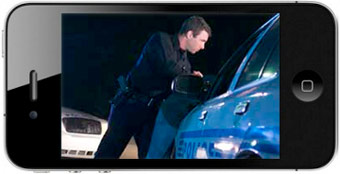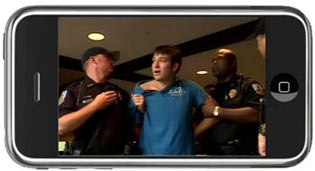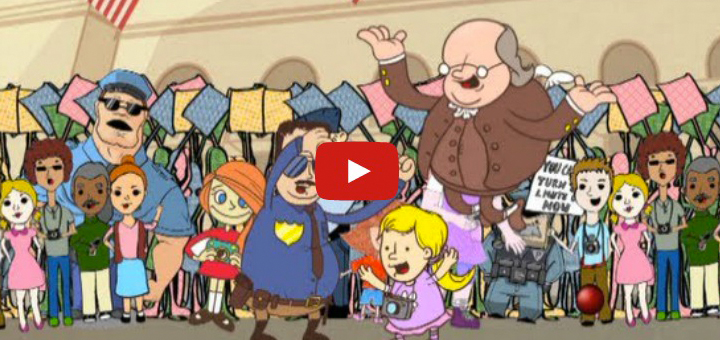The American Civil Liberties Union has collaborated on a short film called Know Your Rights created by actor and HitRecord director Joseph Gordon-Levitt. The film, which premiered at Sundance Film Festival, upholds the right of people to take iPhone videos of on-duty police officers.
At one point a caricature of Ben Franklin issues this decree:
… You see kids, even cops make mistakes, and it’s our job to keep an eye on them. And it’s easy with your modern technology and crazy iPhones…
Amazingly, the animation components were crowdsourced by up to 163 people who contributed images in the six days leading up to the festival.
Do You Have the Right to Record iPhone Video of Police Encounters?

As iPhones and smartphones with video cameras are more widely adopted, clashes between citizens and police over video recording of police encounters have become increasingly common.
The question of whether it is appropriate, both legally and ethically, to record a police officer on duty remains a topic of debate.
Many cases involve a citizen recording a situation where police are publicly performing their duties, followed by an altercation between the camera-wielding citizen and the police officer who is uncomfortable being recorded.
Recent cases in the United States where citizens have gotten into trouble for recording police include:
- When a woman in Rochester, New York this June used her iPod to record a traffic stop while standing on her own property, the police officer making the stop arrested her and charged her with obstruction of governmental administration.
- When a Newark, New Jersey teenager recorded video of police coming to the aid of a man who collapsed on a bus, she was handcuffed by officers and charged with obstruction of justice.
- When Miami Beach Police surrounded an unarmed reckless driver this June and shot him to death, a citizen who recorded the incident had his cellphone allegedly smashed by police.
- When a speeding motorcyclist’s helmet camera captured a traffic stop by an undercover police officer brandishing a gun and failing to promptly identify himself, the Maryland State Police Department showed up at the man’s house days later, seizing several laptops and cameras and slapping him with a “wiretapping” charge that could have resulted in a 16 year prison sentence.
Is It Legal to Record Video of Police Encounters?

Most charges against citizens who record police are eventually dropped since there is no law in the United States forbidding the recording of police encounters.
Just as a citizen has no right to privacy in a public setting, neither does a police officer doing their duty in public. As long as you are not interfering with the police, it is generally considered your First Amendment right to record incidents that occur in public.
Nevertheless, because smartphones with cameras are being adopted so rapidly, the technology is outpacing the law and police who seldom used to encounter citizens with video cameras are often taken aback and respond inappropriately.
Citizen as Watchdog: Recording Police is Good for Democracy
While many police are responsible public servants, citizens with smartphones can act as a check on police abuse and misconduct when it occurs.

My first impression of this “citizen watchdog” phenomenon was in 2007 when a student at my alma mater was tasered at a question-and-answer session with John Kerry for behaving obnoxiously – albeit harmlessly.
Because an audience member recorded the incident and put it on YouTube, the public was able to see the confrontation, and judge for themselves whether the police acted inappropriately.
The iPhone did not have a video camera at the time, but in a post on the taser incident, I anticipated that an iPhone with a video camera could be a powerful tool for democracy because of its ability to record such incidents.
Is It Acceptable to Record Police With Your iPhone?
What do you think? Should the right of a citizen to record a police officer in public be preserved, or is it an obstruction of justice to record an officer on duty? Feel free to share in the comments.
